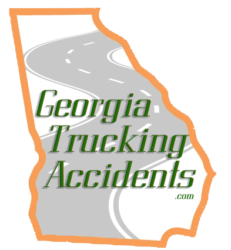Large Truck Driver Regulations in Georgia
The Federal Motor Carrier Safety Administration (FMCSA) has the authority to make rules relating to tractor-trailer trucks operating in interstate commerce. Interstate commerce is a phrase that has an extensive application, and it basically means that the federal authorities have jurisdiction over any vehicle or good under transport by a vehicle that moves across state lines. The state of Georgia has exclusive jurisdiction over trucks that do not cross over state lines or transport any good outside of the state. More often than not, the federal regulations apply to large trucks that travel throughout Georgia.
The FMCSA has issued a voluminous set of rules with which large truck drivers must comply. Some of the regulations deal with fuel conservation and insurance standards, but the bulk of FMCSA’s regulations deal with safety. Federal regulators understand that fully loaded trucks are potentially lethal weapons. Consequently, tractor-trailer drivers must follow the safety standards established by the FMCSA. Failure to do so places every fellow motorist, motorcyclist, pedestrian, and bicyclist on the road in grave danger.
Pre-Trip Safety
Compliance with FMCSA regulations begins before the driver gets behind the wheel. The driver must check the safety systems of the vehicle to ensure the vehicle is running properly and safely. Drivers must also perform safety checks at the end of their trip as well. Compliance with FMCSA’s regulations requires large truck drivers to inspect:
- air brakes,
- parking or hand brake,
- horn,
- lights,
- coupling systems,
- tires for proper inflation and wear,
- rims,
- fuel tanks,
- windows and mirrors, and
- wipers.
A driver must inspect each system in great detail. Any system that fails the safety inspection must be documented and then repaired before the trip commences.
Securing Loads
Additional regulations apply to the load carried by the large truck. The FMCSA issued particular requirements for securing specific loads. For instance, the regulations differ depending upon whether the load is logs, pipe, or metal coils. In addition to using the proper tie-downs and the appropriate number of tie-downs, the strapping and other securement devices must be in good repair and pass inspection before use. Furthermore, regulations require that the driver inspects the load within the first 50 miles of the journey and every 150 miles after that. Truckers will have frequent opportunities to perform this task in Georgia because state regulations mandate that drivers must stop at every open weight station encountered.
Safe Operation
Many of FMCSA’s regulations are devoted to compliance with driver safety. FMCSA’s regulations prohibit drivers who are ill or fatigued from driving. Also, drivers may not use or have in their possession while on duty schedule 1 drugs or stimulants, or other prohibited substances. Similarly, drivers may not consume alcohol within four hours of coming on duty and may not have any perceptible alcohol in their system while driving. A truck driver cannot have an alcoholic beverage in the truck unless it is part of the freight. Moreover, a truck driver cannot text while driving or uses a cellphone while driving except in emergency situations.
The FMCSA also issued very specific anti-fatigue regulations. Drivers cannot drive for more than 11 hours and cannot be on-duty for more than 14 per day. Additionally, a driver must take 30 minutes every eight hours at a minimum. Drivers must also take at least 34 hours off per week. These regulations are designed to give drivers some much-needed rest so they can operate their large trucks safely.
Put Our Law Firm’s Over 33 Years Of Legal Experience To Work For Your Case!
The time you have to legally receive compensation is limited.
Sources:
https://www.ecfr.gov/cgi-bin/retrieveECFR?gp=1&ty=HTML&h=L&mc=true&=PART&n=pt49.5.392#se49.5.392_13
https://www.ecfr.gov/cgi-bin/retrieveECFR?gp=1&ty=HTML&h=L&mc=true&=PART&n=pt49.5.380
http://www.eregulations.com/georgia/commercial/vehicle-inspection/
https://www.fmcsa.dot.gov/regulations/title49/b/5/3?section_type=A
https://www.fmcsa.dot.gov/regulations/cargo-securement/cargo-securement-rules
https://www.fmcsa.dot.gov/sites/fmcsa.dot.gov/files/docs/Final%20Rule_DVIR_2_0_09-12-14.pdf

